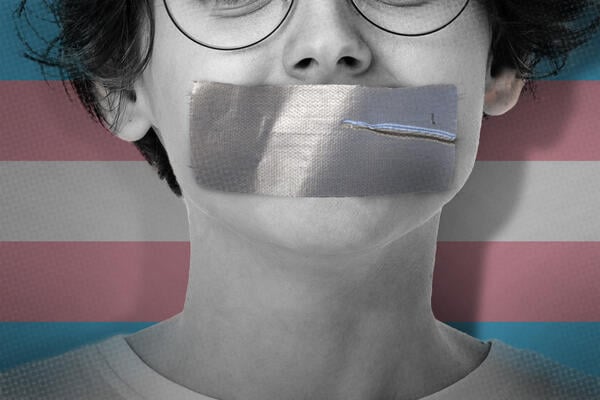
Texas Ban on Transgender Course Content Sows Chaos
Texas Tech’s directives are a “voluntary effort” to censor faculty speech and academic freedom, said a senior attorney at FIRE.
Photo illustration by Justin Morrison/Inside Higher Ed | IanaChyrva/iStock/Getty Images | rawpixel
Officials at several public universities in Texas have instructed faculty to review their syllabi and course content and remove anything that does not comply with current federal and state laws and executive orders. What type of content is noncompliant? It depends on whom you ask.
Officials at San Jacinto College, a community college in greater Houston, asked faculty to review student learning outcomes for their courses and ensure they adhere to the Texas Higher Education Coordinating Board’s Academic Course Guide Manual and Workforce Education Course Manual, said Amanda Fenwick, a spokesperson for the college.
“Leadership wanted faculty to be aware of what was happening at other institutions and to make sure that all content, discussions, and testing aligned with state expectations in the course manuals,” Fenwick wrote in an email. “We understand that there could be legal issues involved, and faculty and staff needed to be aware of how the state was interpreting state and federal laws.”
The college does not intend to create a formal policy prohibiting faculty members from teaching about transgender identity, she said. (Editor’s note: After publication, a San Jacinto faculty member confirmed that faculty were told verbally not to teach anything about gender except for the male-female binary.)
The move follows a tumultuous week in Texas higher education, during which policies, letters and vague directives regarding LGBTQ+ topics discussed in and outside the classroom sowed confusion and fear among faculty, as well as administrators and students. Verbal-only directives circulated a week ago at Texas Tech’s Angelo State University, where employees attended several confusing meetings during which some faculty members were told pride flags, preferred names and pronouns were banned, while others were told that only transgender identity topics in course content was prohibited.
By Friday, one directive was clear: Employees of the Texas Tech system may not teach about, discuss or acknowledge transgender identity. Tedd Mitchell, chancellor of the Texas Tech system, wrote in an email to the five universities’ leaders that they must comply with federal and state laws that “recognize only two human sexes: male and female.”
In an email to employees Friday and obtained by Inside Higher Ed, Angelo State president Ronnie Hawkins noted that “Angelo State does not maintain a standalone policy on this matter,” though he did not specify to which matter he was referring. He was likely referencing university officials’ previous verbal instructions to scrub any mention of transgender people from class content. “Our university operates in alignment with legal requirements and remains diligent in our compliance,” he added.
Don Topliff, provost at Angelo State, followed up with a separate email to faculty members, writing that “recent events at universities across Texas have underscored the importance of understanding compliance responsibilities related to student instruction.” He instructed faculty to review syllabi to remove any “outdated or noncompliant language,” though the email did not specify which language would be considered noncompliant or make any mention of gender identity.
“Not meeting these requirements may bring the university out of compliance with federal and state laws, as well as executive orders,” Topliff wrote. “Gaps in compliance may prompt the need for corrective actions.”
Texas A&M University is undergoing a similar process. After the university ousted its president, demoted two administrators and fired a professor in response to a viral video about a gender identity lecture, the system Board of Regents ordered a systemwide course audit to ensure content is in “compliance with applicable laws.”
In almost every written communication about the new policies, including a statement to Inside Higher Ed, Texas Tech officials cite Texas House Bill 229, President Donald Trump’s Jan. 20 executive order and a Jan. 30 letter from Gov. Greg Abbott that said, “All Texas agencies must ensure that agency rules, internal policies, employment practices, and other actions comply with the law and the biological reality that there are only two sexes—male and female.” Still, there are no federal or state laws that prohibit public university professors from teaching about transgender identity.
“They’re pointing to an executive order from Trump and this letter from the governor, but … those are not intended to create a speech code for public universities. If they apply to a public university in this fashion, it wouldn’t just be Texas Tech doing it,” said Adam Steinbaugh, a senior attorney at the Foundation for Individual Rights and Expression who is communicating with Texas faculty about the new directives. “So this is really just a voluntary effort to go out and censor, and it’s not supported by the executive order, and it’s certainly contradictory to the First Amendment.”
The Texas conference of the American Association of University Professors released a statement Friday encouraging faculty to report any instances of censorship to FIRE, which is gathering information about the actions. The Texas AAUP has received anonymous reports of similar censorship efforts at other Texas public universities, but none has been publicly confirmed.
In a Reddit thread about the Texas Tech policies, an unnamed faculty member at another Texas Tech institution wrote, “Our directives were vague, and chairs/deans were tasked with outlining policy with no guidance. The Angelo State memo was shocking, but at least upper administration was willing to make the calls rather than forcing deans/chairs to do so. I feel like the string quartet still playing on the Titanic.”
Source link


